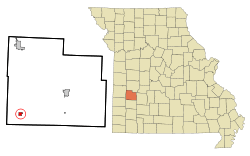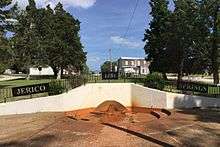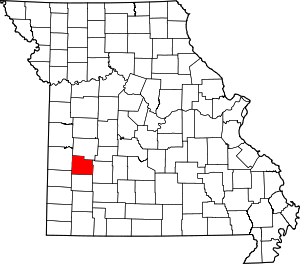Jerico Springs, Missouri
Jerico Springs is a village in Cedar County, Missouri, United States. The population was 228 at the 2010 census.
Jerico Springs, Missouri | |
|---|---|
 Location of Jerico Springs, Missouri | |
| Coordinates: 37°37′15″N 94°0′33″W | |
| Country | United States |
| State | Missouri |
| County | Cedar |
| Area | |
| • Total | 0.68 sq mi (1.77 km2) |
| • Land | 0.68 sq mi (1.77 km2) |
| • Water | 0.00 sq mi (0.00 km2) |
| Elevation | 1,017 ft (310 m) |
| Population | |
| • Total | 228 |
| • Estimate (2019)[3] | 231 |
| • Density | 337.72/sq mi (130.35/km2) |
| Time zone | UTC-6 (Central (CST)) |
| • Summer (DST) | UTC-5 (CDT) |
| ZIP code | 64756 |
| Area code(s) | 417 |
| FIPS code | 29-37214[4] |
| GNIS feature ID | 0729910[5] |

History
Jerico Springs was platted in 1882. Its name is derived from both the ancient city of Jericho and that of Joseph B. Carrico, the owner of the town site.[6]
Geography
Jerico Springs is located in the southwestern corner of Cedar County on Missouri Route 97. Stockton Lake lies approximately ten miles to the east of the town.[7] The area is within the Springfield Plateau region of the Ozarks.
According to the United States Census Bureau, the village has a total area of 0.68 square miles (1.76 km2), all land.[8]
Demographics
| Historical population | |||
|---|---|---|---|
| Census | Pop. | %± | |
| 1890 | 486 | — | |
| 1900 | 443 | −8.8% | |
| 1910 | 395 | −10.8% | |
| 1920 | 262 | −33.7% | |
| 1930 | 247 | −5.7% | |
| 1940 | 254 | 2.8% | |
| 1950 | 235 | −7.5% | |
| 1960 | 179 | −23.8% | |
| 1970 | 188 | 5.0% | |
| 1980 | 208 | 10.6% | |
| 1990 | 247 | 18.8% | |
| 2000 | 259 | 4.9% | |
| 2010 | 228 | −12.0% | |
| Est. 2019 | 231 | [3] | 1.3% |
| U.S. Decennial Census[9] | |||
2010 census
As of the census[2] of 2010, there were 228 people, 87 households, and 56 families residing in the village. The population density was 335.3 inhabitants per square mile (129.5/km2). There were 124 housing units at an average density of 182.4 per square mile (70.4/km2). The racial makeup of the village was 96.5% White and 3.5% from two or more races. Hispanic or Latino of any race were 2.2% of the population.
There were 87 households, of which 34.5% had children under the age of 18 living with them, 40.2% were married couples living together, 16.1% had a female householder with no husband present, 8.0% had a male householder with no wife present, and 35.6% were non-families. 28.7% of all households were made up of individuals, and 11.5% had someone living alone who was 65 years of age or older. The average household size was 2.62 and the average family size was 3.25.
The median age in the village was 36.5 years. 27.2% of residents were under the age of 18; 11% were between the ages of 18 and 24; 20.6% were from 25 to 44; 26.2% were from 45 to 64; and 14.9% were 65 years of age or older. The gender makeup of the village was 51.8% male and 48.2% female.
2000 census
As of the census[4] of 2000, there were 259 people, 104 households, and 74 families residing in the village. The population density was 384.0 people per square mile (149.3/km2). There were 130 housing units at an average density of 192.8 per square mile (74.9/km2). The racial makeup of the village was 97.30% White, 0.77% Native American, 0.39% Asian, and 1.54% from two or more races. Hispanic or Latino of any race were 0.39% of the population.
There were 104 households, out of which 34.6% had children under the age of 18 living with them, 58.7% were married couples living together, 8.7% had a female householder with no husband present, and 27.9% were non-families. 26.9% of all households were made up of individuals, and 12.5% had someone living alone who was 65 years of age or older. The average household size was 2.49 and the average family size was 2.96.
In the village, the population was spread out, with 29.0% under the age of 18, 5.4% from 18 to 24, 28.2% from 25 to 44, 21.2% from 45 to 64, and 16.2% who were 65 years of age or older. The median age was 36 years. For every 100 females, there were 100.8 males. For every 100 females age 18 and over, there were 97.8 males.
The median income for a household in the village was $22,188, and the median income for a family was $30,750. Males had a median income of $30,625 versus $13,750 for females. The per capita income for the village was $11,094. About 8.0% of families and 12.4% of the population were below the poverty line, including 3.3% of those under the age of 18 and 25.8% of those 65 or over.
References
- "2019 U.S. Gazetteer Files". United States Census Bureau. Retrieved July 26, 2020.
- "U.S. Census website". United States Census Bureau. Retrieved 2012-07-08.
- "Population and Housing Unit Estimates". United States Census Bureau. May 24, 2020. Retrieved May 27, 2020.
- "U.S. Census website". United States Census Bureau. Retrieved 2008-01-31.
- "US Board on Geographic Names". United States Geological Survey. 2007-10-25. Retrieved 2008-01-31.
- Eaton, David Wolfe (1916). How Missouri Counties, Towns and Streams Were Named. The State Historical Society of Missouri. pp. 273.
- Missouri Atlas & Gazetteer, DeLorme, 1998, First edition, p. 51, ISBN 0-89933-224-2
- "US Gazetteer files 2010". United States Census Bureau. Archived from the original on 2012-07-02. Retrieved 2012-07-08.
- "Census of Population and Housing". Census.gov. Retrieved June 4, 2015.
External links
- Historic maps of Jerico Springs in the Sanborn Maps of Missouri Collection at the University of Missouri
